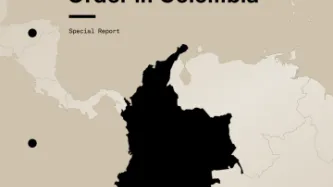Search
Content type: Advocacy
Dejusticia, Fundación Karisma, and Privacy International submitted a joint stakeholder report on Colombia to the 44th session of the Universal Periodic Review at the UN Human Rights Council.Our submission raised concerns regarding the protection of the rights to freedom of expression and opinion, to privacy, and to personal data protection; the shutdown of civil society spaces; protection of the right to protest; and protection of the rights of the Venezuelan migrant and refugee population.…
Content type: News & Analysis
Our intervention comes on the back of mounting evidence that the South African state’s surveillance powers have been abused, and so-called “checks & balances” in RICA have failed to protect citizens’ constitutional right to privacy.
Among our core arguments are:
That people have a right to be notified when their communications have been intercepted so that they can take action when they believe their privacy has been unlawfully breached. Currently RICA prevents such notification, unlike…
Content type: Long Read
Privacy International is celebrating Data Privacy Week, where we’ll be talking about privacy and issues related to control, data protection, surveillance and identity. Join the conversation on Twitter using #dataprivacyweek.
Exercising the right to privacy extends to the ability of accessing and controlling our data and information, the way it is being handled, by whom, and for what purpose. This right is particularly important when it comes to control of how States perform these activities.…
Content type: Press release
This week in Geneva, the UN Human Rights Committee will examine Colombia’s compliance with the International Covenant on Civil and Political Rights (ICCPR). This review, by a body of independent experts charged with monitoring compliance with the ICCPR, comes just weeks after the peace deal between President Juan Manuel Santos and Farc leader Timoleon Jimenez was rejected by voters and months after it was revealed that an investigative journalist was put under surveillance by the Colombian…
Content type: News & Analysis
Over a dozen international companies are supplying powerful communications surveillance technology in Colombia, according to a Privacy International investigation released today featuring original documentation. Over the past few decades, companies primarily from Israel, the US, and the UK have worked with Colombian partners to expand the Government's surveillance capacities. This is despite evidence that the Government is undertaking unlawful surveillance of Colombians.
The…
Content type: Report
For nearly two decades, the Colombian government has been expanding its capacity to spy on the private communications of its citizens. Privacy International's investigation reveals the state of Colombia's overlapping, unchecked systems of surveillance, including mass surveillance, that are vulnerable to abuse.
See the report in English and Spanish.
Content type: News & Analysis
“We always assume we are being watched. It is part of our understanding,” explained Father Alberto. The clergyman knows what it's like to live under surveillance. Father Alberto is Executive Secretary of the Inter-ecclesiastical Commission for Justice and Peace in Colombia, which supports displaced and conflict-affected communities in their struggle for justice. The CIJP also works in the restive Urabá region, where they document and litigate on the links between neo-paramilitary groups,…
Content type: News & Analysis
A sizeable political controversy has engulfed President Goodluck Jonathan’s Government in Nigeria, where details surrounding its plans for the total surveillance of Africa’s most populous country continue to emerge.
Thanks to pervasive snooping technology readily found and developed in the US, UK, Israel and the Netherlands, the already spy-equipped security forces in Nigeria will have greater and more intimate access to the lives of some 56 million Internet users and 115 million active fixed…
Content type: News & Analysis
This year, an advanced surveillance system called the "Platform for Unified Monitoring and Analysis" will come online in Colombia. Frustrated with the the previous system, Esperanza, which only monitored telecommunications activity, the Colombian authorities turned to PUMA (Plataforma Única de Monitoreo y Análisis), a system that will allow them to monitor both telecommunications traffic and IP traffic in one source. The system, now based on Police property in Western Bogota, will now be…
Content type: News & Analysis
In the wake of recent revelations about the NSA’s extensive surveillance powers over foreigners and American citizens, an ever-fuller picture of mass surveillance is being drawn in the US, the UK, and across the Western world. But what about clandestine surveillance practices in African states? How do they approximate or differ from those we’ve heard so much about in the last few weeks? A recent case from West Africa can help us begin to answer these questions.
In March,…








